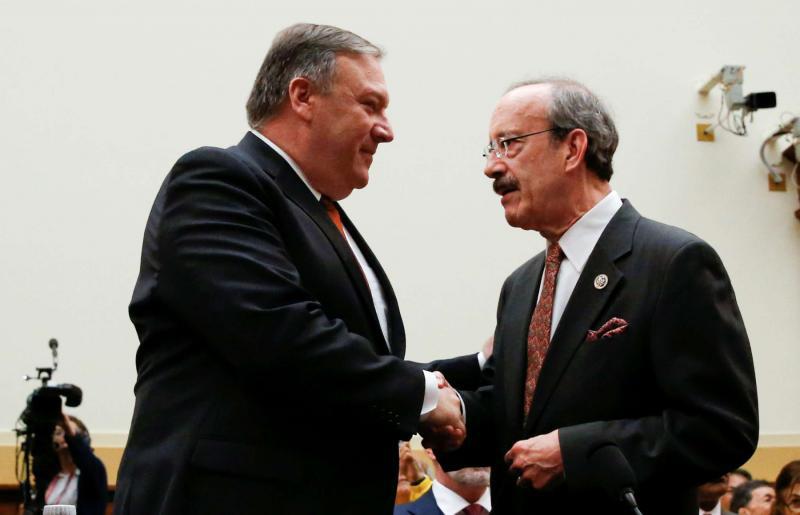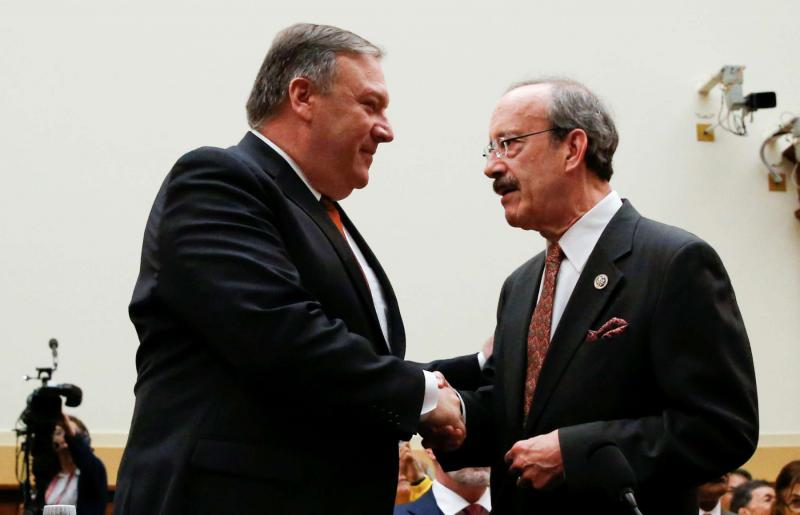Elections introduce new pressures on Trump’s Middle East policies
WASHINGTON - The Democratic Party’s takeover of the US House of Representatives will not change bipartisan fundamentals, such as support for Israel and hostility towards Iran, but could bring increased scrutiny to US Middle East policies and renewed interest in reviving the Iran nuclear accord.
After winning a majority of seats in the House during elections November 6, Democrats will inject a greater dose of scepticism and scrutiny to US President Donald Trump’s Middle East policies, a change from Trump’s first two years in office when members of his Republican Party controlled both the House and the US Senate and supported his strategy.
“You’re going to see much greater scrutiny of the administration’s policies in the Middle East,” Derek Chollet, a former assistant secretary of defence in the Obama administration and US State Department official said November 8 at the Middle East Institute’s annual conference. “To people on the outside, the policy is going to seem more confusing than it has in the past.”
“On Yemen, there’s going to be much higher scrutiny of US arms sales. I don’t see Congress having much appetite for approving many of those,” Chollet said, referring to sales of US military equipment to Saudi Arabia and other countries fighting Iran-supported Houthi rebels in Yemen who overthrew the country’s internationally recognised government.
Paul Salem, president of the Middle East Institute, said Democrats were likely to oppose the “enormous squeeze that was put on Palestinian institutions” by the Trump administration, which cut more than $200 million in aid to Palestinians and closed the Palestinian Liberation Organisation’s office in Washington.
Salem said Democrats would oppose continued US military presence in Syria, which Trump has viewed sceptically, although his senior advisers convinced him to keep the United States in the war-torn country to counter Iran.
Democrats will officially take control of the House in January but have wasted no time in showing they will scrutinise all aspects of the Trump administration. On November 8, one day after Trump forced out Attorney General Jeff Sessions, Democrats said they would investigate the firing out of concern that Trump was trying to interfere with the US Justice Department. It has been investigating alleged Russian interference in the 2016 presidential election and whether Trump’s campaign worked with Russians to sway the vote in his favour.
Democratic leaders have played down speculation they would take steps to remove Trump from office. One day after the election, Trump warned on Twitter: “If the Democrats are going to waste Taxpayer Money investigating us at the House level, then we will likewise be forced to consider investigating them for leaks of classified information and much else, at the Senate level. Two can play that game!”
The Senate remains controlled by Republicans, who picked up at least two seats in the 100-seat body in the November 6 elections.
A key figure in Washington will be Representative Eliot Engel, a Democrat from New York who is expected to become chairman of the House Foreign Affairs Committee. Engel is a strong supporter of Israel and of a two-state solution to the Palestinian-Israeli conflict. He will seek answers from the Trump administration on its Middle East peace plan, Gerald Feierstein, a former veteran Middle East diplomat, predicted.
“He’s going to be very interested in seeing what the administration is actually thinking of in Israeli-Palestinian issues,” Feierstein said of Engel. “He’s very balanced and he’s a moderate person.”
The broad support in Congress for Israel is not likely to change nor will the opposition to the Iranian regime but Democrats are more supportive than Republicans of the Joint Comprehensive Plan of Action (JCPOA) — the Iran nuclear deal — that Democratic President Barack Obama signed and which Trump disavowed before reinstating sanctions against Iran.
“There’ll be an effort among Democrats to keep the embers of the JCPOA alive in any way they can,” Chollet said. “When European leaders come to Washington, they’ll meet with Democrats and talk about things like JCPOA and Iran. There’s going to be a lot more agreement between Washington and Europe now than there was six months ago.”
Democrats will pressure the Trump administration to use its leverage to scale back the Saudi-led bombings in Yemen, Salem said. “I think the administration is already going in that direction and the Democrats would be in favour of that but that doesn’t at all end the Yemeni civil war,” he said. “It also does not end the humanitarian crisis, which is not a result of the air campaign. It’s a result of very complex security, political and economic conditions inside Yemen.
Thomas Frank is a correspondent in Washington.
This article was originally published in The Arab Weekly.







